Pressure Washing St. Matthews
Top Power Washing in St. Matthews
Receive multiple Exterior Cleaning quotes for your project today! Compare profiles, reviews, accreditations, portfolio, etc... and choose the best deal.

Kentuckiana Pro Wash
513 reviewsElizabeth, IN, 11594 Majestic Way SE, 47117, USAt Kentuckiana Pro Wash, we're proud to be the top choice for quality pressure washing services in Louisville and the surrounding areas. Whether you need residential or commercial pressure washing services, we have the skills and expertise to get the job done right. Our team of highly trained technicians uses state-of-the-art equipment and the latest techniques to ensure your property receives the best possible care. We take pride in our work and always go the extra mile to exceed our customers' expectations.
- Services
- Why Us?
- Our Team
- Testimonials
- Gallery
Get Quote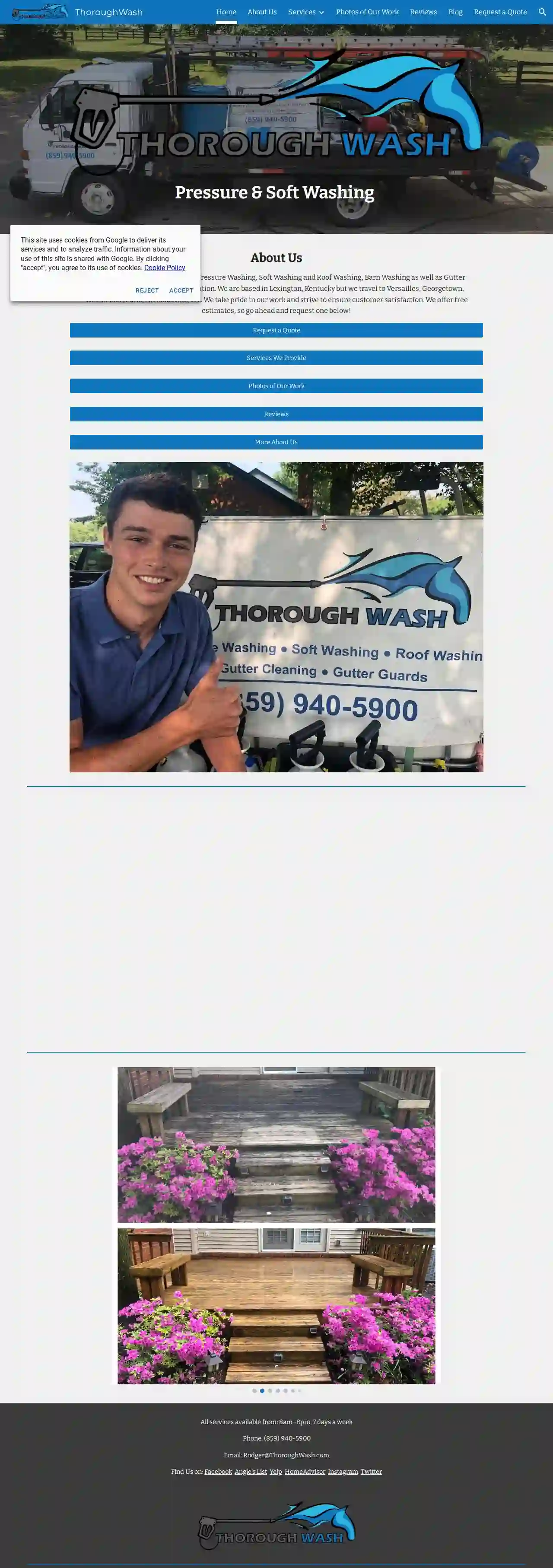
ThoroughWash Pressure & Soft Washing
511 reviewsLexington, USThoroughWash Pressure & Soft Washing is a Lexington based business which was founded in 2020. Although the business is relatively new, all of our employees have multiple years of experience in the field. We are fully insured and our main goal is keeping our customers happy! We specialize in pressure washing, soft washing, roof washing, gutter cleaning and gutter guard installation. We offer prices which are hard to beat, quality that is unmatched, exceptional customer service and free estimates. So go ahead and request a quote today!
- Services
- Why Us?
- Gallery
Get Quote
SC Pro Wash
533 reviews101 S Lake Drive, Lexington, 29073, USSC Pro Wash offers a variety of pressure washing services and soft washing services for all types of clean up and curb appeal projects. We are a locally owned and operated pressure washing contractor with the equipment and expertise to wash and clean everything including driveways and walkways; concrete, brick, pavers; and all kinds of residential or commercial cleaning projects. Our team of cleaning technicians are dedicated to your complete satisfaction. So, if you're looking for a pressure washing contractor to provide quality, affordable exterior cleaning in the Lexington County and Richland County SC area, contact SC Pro Wash for a free estimate.
- Services
- Why Us?
- Our Team
- Testimonials
- Gallery
Get Quote
Royal Property Services
4.58 reviewsLouisville, USRoyal Property Services is a family-owned and operated business serving the Louisville, Kentucky area. We specialize in exterior cleaning services, including pressure washing, soft washing, roof washing, and concrete washing. Our team is dedicated to providing high-quality work and exceptional customer service. We believe in treating our customers like family and going the extra mile to ensure their satisfaction. We are committed to ethical business practices and strive to build lasting relationships with our clients. We offer free estimates and competitive pricing, and we are happy to customize packages to meet your specific needs. Whether you need to clean your home's siding, driveway, or deck, or you have a larger commercial project, we have the experience and expertise to get the job done right. We are proud to serve the Louisville community and look forward to helping you achieve a beautiful and clean exterior for your property.
- Services
- Why Us?
- Our Team
- Testimonials
- Gallery
Get Quote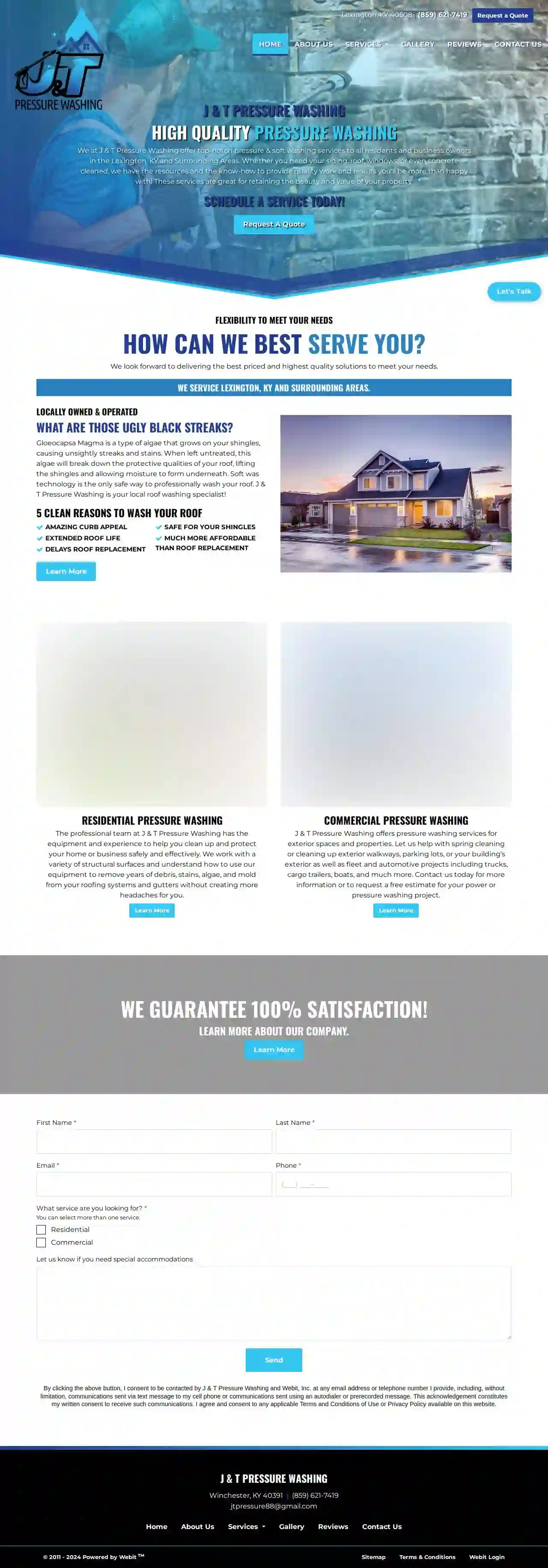
J&T Pressure Washing LLC
Lexington, 40508, USJ & T Pressure Washing is a locally owned and operated pressure washing contractor serving Lexington, KY and the surrounding areas. We offer a variety of residential and commercial cleaning services, including siding, roof, and much more. Our team is dedicated to delivering professional cleaning and friendly customer care for an exceptional customer experience. We utilize soft wash technology, a low-pressure, solution-based cleaning method that is safe for your property. Whether you need your home or business refreshed, J & T Pressure Washing is your trusted partner for all your pressure washing needs. Contact us today for a free estimate and let us help you maintain the beauty and value of your property.
- Services
- Why Us?
- Gallery
Get Quote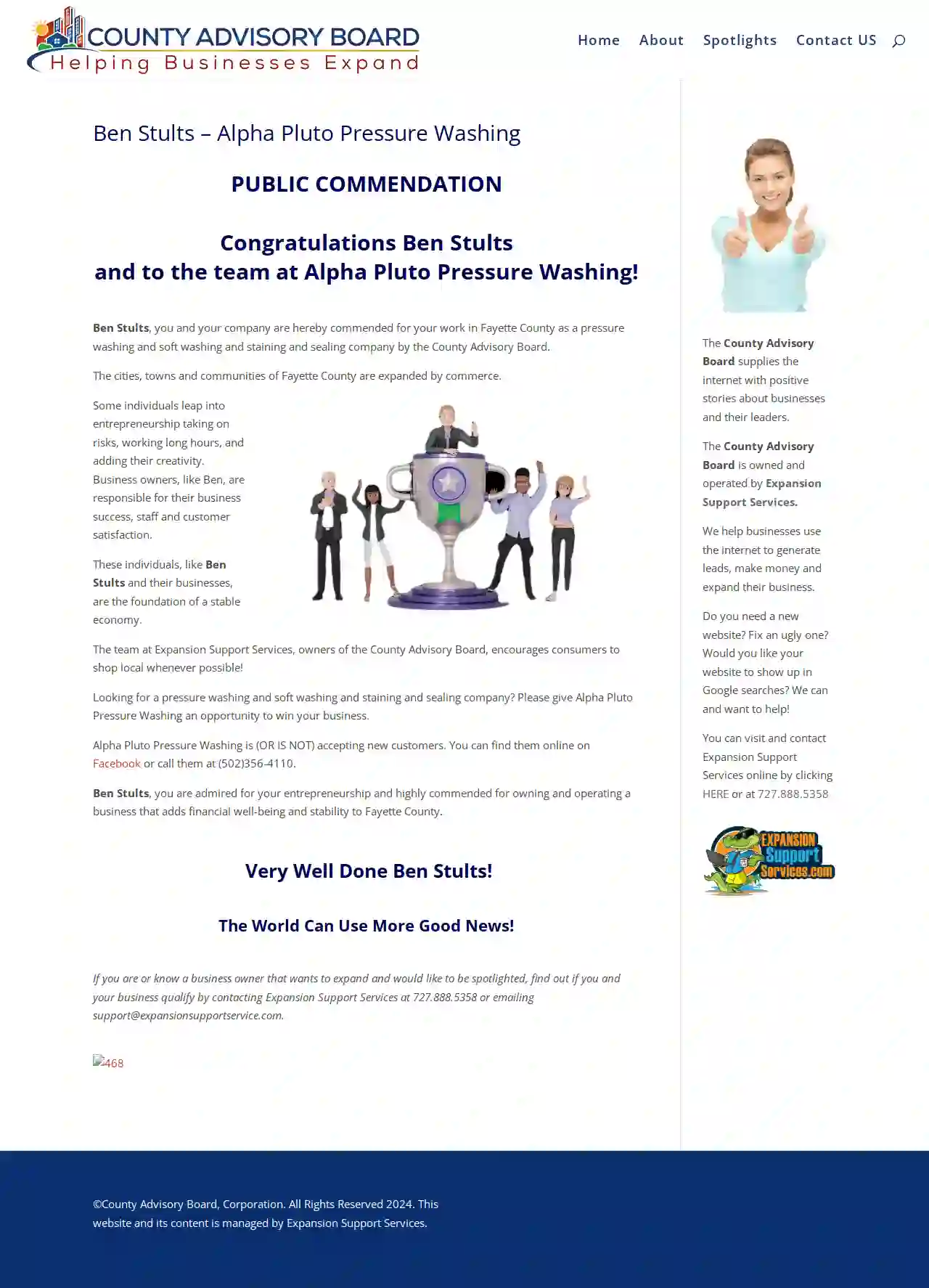
Alpha Pluto Pressure Washing
514 reviews123 Main St, Suite 100, Louisville, 40203, USThe County Advisory Board is a national organization helping business owners across the 3,143 US Counties have well-run, productive and profitable companies. It promotes involvement in local chambers, Little League, networking groups, business associations, fantasy football clubs, the Girl Scouts and every other sane opportunity for businesses, groups, associations and individuals. The County Advisory Board is not part of the any county government agency, your Chamber of Commerce, Better Business Bureau or other social organizations, but strongly suggests that all businesses join their local Chamber and/or other various business organizations.
- Services
- Why Us?
- Accreditations
- Our Team
- Testimonials
- Gallery
Get Quote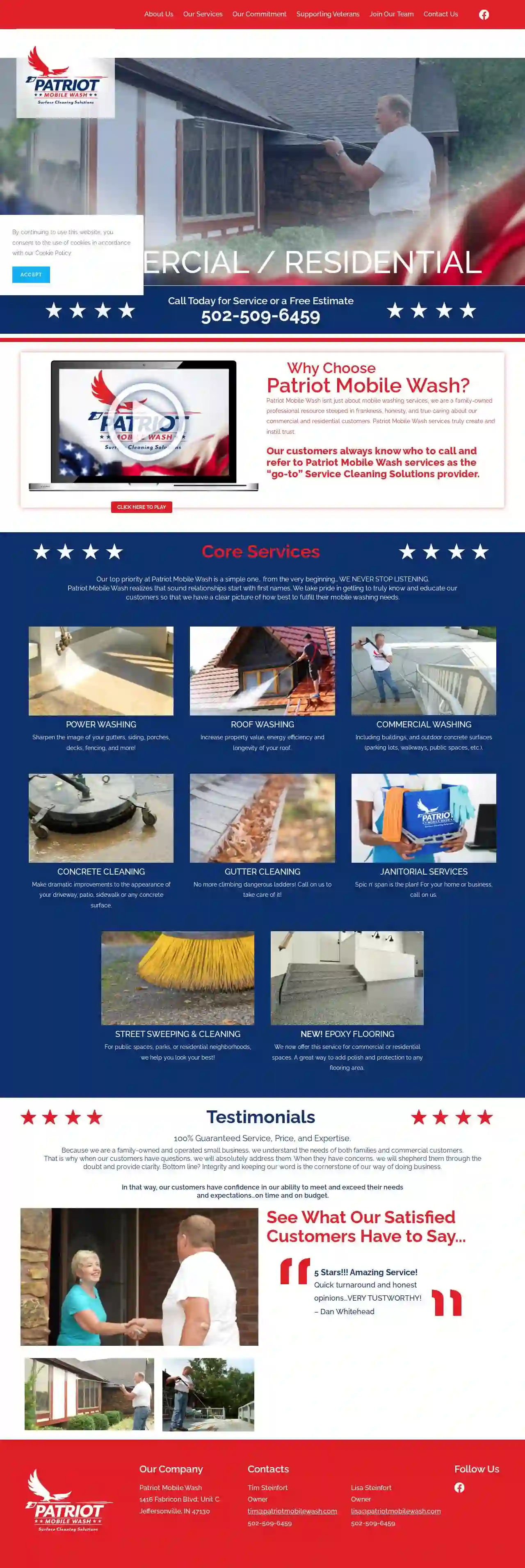
Patriot Mobile Wash
4.67 reviews1416 Fabricon Blvd, Unit C, 1416 Fabricon Blvd; Unit C, Jeffersonville, 47130, USPatriot Mobile Wash is a family-owned and operated business dedicated to providing professional mobile washing services for both commercial and residential customers. We pride ourselves on our commitment to honesty, transparency, and building strong relationships with our clients. Our team takes the time to understand your individual needs and provide customized solutions that exceed your expectations. We offer a wide range of services, including power washing, roof washing, commercial washing, concrete cleaning, gutter cleaning, janitorial services, street sweeping, and new epoxy flooring. We are fully insured and guarantee our service, price, and expertise.
- Services
- Why Us?
- Our Team
- Testimonials
- Gallery
Get Quote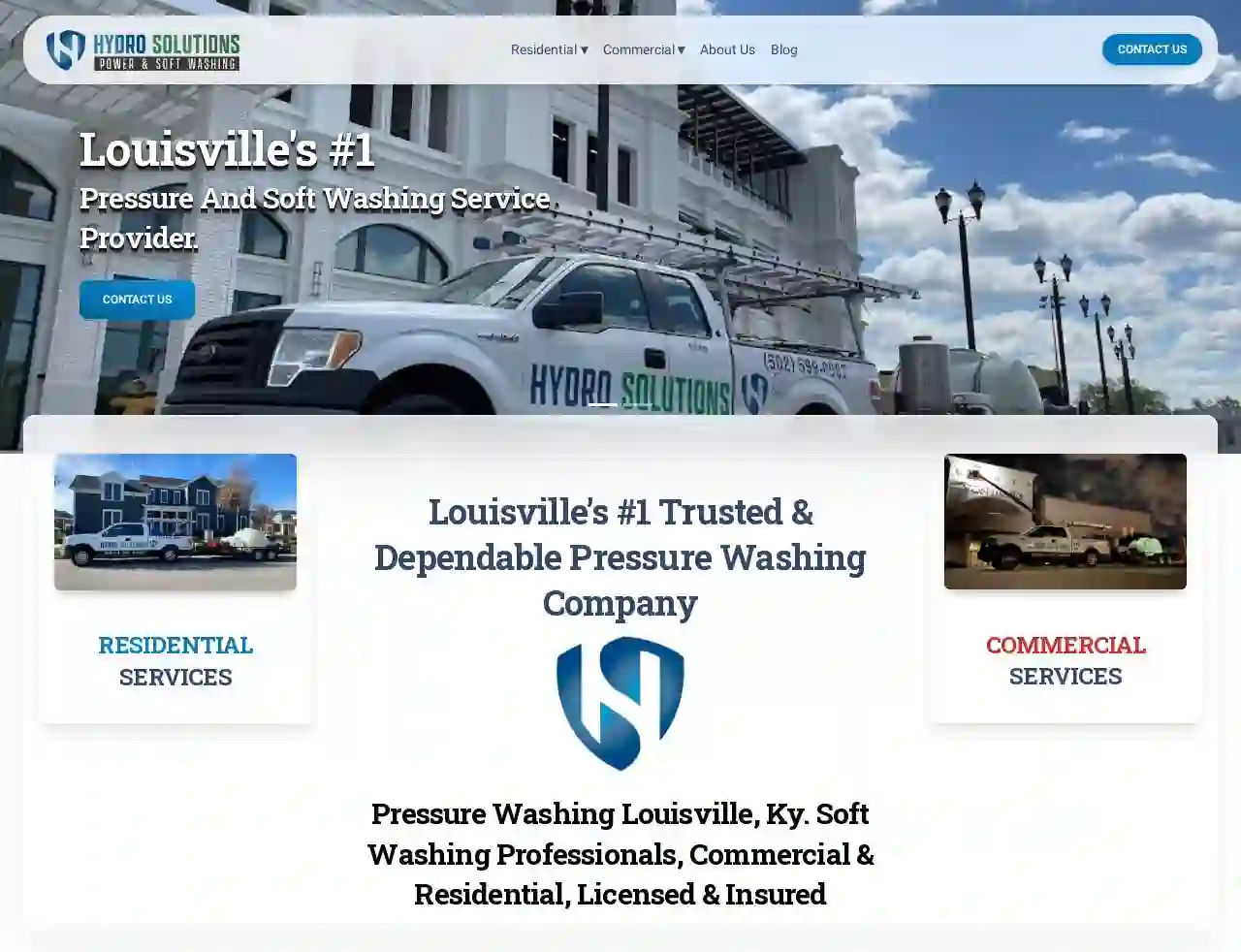
Hydro Solutions Power And Soft Washing LLC
4.9107 reviewsLouisville, USLouisville's #1 Pressure And Soft Washing Service Provider. Contact Us Louisville's #1 Choice for Commercial And Residential Pressure Washing Services! Contact Us Louisville’s #1 Trusted & Dependable Pressure Washing Company Pressure Washing Louisville, Ky. Soft Washing Professionals, Commercial & Residential, Licensed & Insured Nevertheless as an experienced Louisville Ky pressure washing company and soft washing service provider. Hydro Solutions will protect your home and property from damage while removing years of dirt and grime In Just One Visit. Experience first-rate service working with our team of experts. Satisfaction Guarantee Hydro Solutions Power And Soft Washing LLC is looking froward to offing you a Professional Pressure Washing Service. We service the Louisville, Ky area’s, and surrounding counties. Also Providing Power Washing Services to all of Southern Indiana as well. Pressure washing services in Louisville, Ky, and Southern Indiana are important. Plus for keeping the cleanliness and curb appeal of residential and commercial properties. The warm weather in these areas can contribute to the buildup of mold, mildew, and algae, mostly on siding, driveways, and decks. Power washing, or Soft Washing, can effectively remove these unsightly and potentially damaging organic substance’s. Soft Washing your surfaces to their original condition. In Louisville and Southern Indiana, pressure washing services can be provided for a wide range of clients. To homeowners clean their property’s curb appeal or businesses needing to maintain a clean exterior with a building soft wash. Hydro Solutions Power And Soft Washing power washing services often include cleaning of concrete, such as sidewalks and parking lots. Which can build up dirt, grime, oil, gum, and algae over time. Moreover, we as a power washing company specialize in services with a soft wash. Like roof cleaning, gutter brightening, house washing, concrete cleaning, and deck washing. We focus on customer satisfaction and job quality, Hydro Solutions Power And Soft Washing only use’s eco-friendly Soft Washing Solutions. Our strategies to suit any type of surfaces, guaranteeing a clean without causing damage to your commercial our residential property. Commercial or Residential soft washing we have you covered with a Satisfaction Guarantee Get A Free Quote Today
- Services
- Why Us?
- Gallery
Get Quote
Profusion Pressure Washing
4.958 reviewsLexington, KY, 1108 Pepperhill Cir., 40502, USProfusion Pressure Washing is the leading pressure washing provider for Lexington and surrounding areas. Our Services include pressure washing to your homes, roofs, driveways, sidewalks, decks, and fences. We use state-of-the-art equipment, soft washing techniques, and curated cleaning products to deliver lasting results that increase the durability and longevity of your home.
- Services
- Why Us?
- Our Team
- Testimonials
- Gallery
Get Quote
Performance Pressure Washing
532 reviews11700 Hancock Trace Ct, Louisville, 40245, USPerformance Pressure Washing is a locally owned and operated business serving the Louisville, KY area. We specialize in a variety of pressure washing services, including residential and commercial power washing, freight truck power washing, deck cleaning, driveway sealing, and dining room/kitchen floor cleaning. We also offer restaurant and bar hood system cleaning. Our team of experts has years of experience in the industry and is dedicated to providing high-quality service at competitive prices. We understand the importance of maintaining the comfort and ambience of your deck, which is why we offer professional deck staining services. We use only the highest quality stains and sealants to protect your deck from the elements and enhance its beauty.
- Services
- Why Us?
- Accreditations
- Our Team
- Testimonials
- Gallery
Get Quote
Over 60,241+ Janitorial Companies in our network
Our janitorial contractors operate in St. Matthews and surrounding areas!
CleaningMatch has curated and vetted the Best Cleaning Services in St. Matthews. Find a trustworthy pro today.
Frequently Asked Questions About Pressure Washing
- Driveways: Removes oil stains, tire marks, dirt, and grime, restoring the appearance of concrete, asphalt, or paver driveways.
- Decks and Patios: Cleans wood, composite, or concrete decks and patios, removing dirt, mildew, and algae, and preparing them for staining or sealing.
- Fences: Revitalizes wood, vinyl, or composite fences, removing dirt, grime, and weathering, and enhancing their appearance.
- Siding: Cleans vinyl, aluminum, brick, or wood siding, removing dirt, mold, mildew, and other contaminants, and restoring its original color.
- Roofs: Removes moss, algae, and other debris from roofs, extending their lifespan and improving their appearance. Soft washing is typically recommended for roof cleaning to prevent damage.
- Walkways and Sidewalks: Cleans concrete or brick walkways and sidewalks, removing dirt, grime, and stains, and improving safety by reducing slipperiness.
- Brick and Stone: Cleans brick and stone surfaces, removing dirt, mildew, and efflorescence, and restoring their natural beauty.
- Spring and Fall: Spring and fall are often ideal for pressure washing as the temperatures are moderate and the weather is typically dry.
- Summer: Pressure washing can be done in the summer, but avoid doing so during the hottest part of the day to prevent the cleaning solutions from drying too quickly and leaving streaks.
- Winter: Pressure washing is possible in the winter, but be mindful of freezing temperatures that can affect cleaning solutions and cause slippery surfaces.
- Soft Washing: Soft washing is generally recommended for wood decks as it uses lower pressure and specialized cleaning solutions to safely remove dirt, mildew, and algae without causing damage.
- Lower Pressure Setting: If using a pressure washer on a wood deck, use a lower pressure setting (around 1500 PSI) and a wide-angle nozzle (25-40 degrees).
- Maintain Distance: Hold the nozzle at least 12 inches away from the deck surface to prevent etching or splintering.
- Professional Pressure Washing: If you're unsure about pressure washing your deck safely, hire a professional pressure washing company with experience in cleaning wood surfaces.
- Using Excessive Pressure: High-pressure water spray can damage delicate surfaces like wood siding or painted surfaces.
- Using the Wrong Nozzle: Different nozzles produce different spray patterns and pressure levels. Using the wrong nozzle can cause streaks, uneven cleaning, or damage.
- Holding the Nozzle Too Close to the Surface: Holding the nozzle too close can etch or damage the surface. Maintain a safe distance as recommended by the pressure washer manufacturer.
- Skipping Pre-Treatment: For stubborn stains or mold growth, pre-treating the surface with a cleaning solution can enhance cleaning effectiveness.
- Not Protecting Plants and Landscaping: Pressure washing chemicals and debris can harm plants and landscaping. Cover or shield sensitive areas before pressure washing.
What surfaces can be pressure washed?
It's important to note that different surfaces require different pressure levels and cleaning solutions. Always consult with a professional pressure washing company to determine the appropriate cleaning method for your specific needs.
What is the best time of year for pressure washing?
Choose a day with mild temperatures and dry weather for optimal pressure washing results. Avoid pressure washing in extreme heat, freezing temperatures, or rainy conditions.
Can pressure washing damage my deck?
By using the right cleaning method and precautions, you can effectively clean your wood deck without causing damage and prolong its lifespan.
What are some common pressure washing mistakes to avoid?
If you're unsure about pressure washing techniques or the appropriate pressure levels for your surfaces, consult with a professional pressure washing company.
What surfaces can be pressure washed?
- Driveways: Removes oil stains, tire marks, dirt, and grime, restoring the appearance of concrete, asphalt, or paver driveways.
- Decks and Patios: Cleans wood, composite, or concrete decks and patios, removing dirt, mildew, and algae, and preparing them for staining or sealing.
- Fences: Revitalizes wood, vinyl, or composite fences, removing dirt, grime, and weathering, and enhancing their appearance.
- Siding: Cleans vinyl, aluminum, brick, or wood siding, removing dirt, mold, mildew, and other contaminants, and restoring its original color.
- Roofs: Removes moss, algae, and other debris from roofs, extending their lifespan and improving their appearance. Soft washing is typically recommended for roof cleaning to prevent damage.
- Walkways and Sidewalks: Cleans concrete or brick walkways and sidewalks, removing dirt, grime, and stains, and improving safety by reducing slipperiness.
- Brick and Stone: Cleans brick and stone surfaces, removing dirt, mildew, and efflorescence, and restoring their natural beauty.
It's important to note that different surfaces require different pressure levels and cleaning solutions. Always consult with a professional pressure washing company to determine the appropriate cleaning method for your specific needs.
What is the best time of year for pressure washing?
- Spring and Fall: Spring and fall are often ideal for pressure washing as the temperatures are moderate and the weather is typically dry.
- Summer: Pressure washing can be done in the summer, but avoid doing so during the hottest part of the day to prevent the cleaning solutions from drying too quickly and leaving streaks.
- Winter: Pressure washing is possible in the winter, but be mindful of freezing temperatures that can affect cleaning solutions and cause slippery surfaces.
Choose a day with mild temperatures and dry weather for optimal pressure washing results. Avoid pressure washing in extreme heat, freezing temperatures, or rainy conditions.
Can pressure washing damage my deck?
- Soft Washing: Soft washing is generally recommended for wood decks as it uses lower pressure and specialized cleaning solutions to safely remove dirt, mildew, and algae without causing damage.
- Lower Pressure Setting: If using a pressure washer on a wood deck, use a lower pressure setting (around 1500 PSI) and a wide-angle nozzle (25-40 degrees).
- Maintain Distance: Hold the nozzle at least 12 inches away from the deck surface to prevent etching or splintering.
- Professional Pressure Washing: If you're unsure about pressure washing your deck safely, hire a professional pressure washing company with experience in cleaning wood surfaces.
By using the right cleaning method and precautions, you can effectively clean your wood deck without causing damage and prolong its lifespan.
What are some common pressure washing mistakes to avoid?
- Using Excessive Pressure: High-pressure water spray can damage delicate surfaces like wood siding or painted surfaces.
- Using the Wrong Nozzle: Different nozzles produce different spray patterns and pressure levels. Using the wrong nozzle can cause streaks, uneven cleaning, or damage.
- Holding the Nozzle Too Close to the Surface: Holding the nozzle too close can etch or damage the surface. Maintain a safe distance as recommended by the pressure washer manufacturer.
- Skipping Pre-Treatment: For stubborn stains or mold growth, pre-treating the surface with a cleaning solution can enhance cleaning effectiveness.
- Not Protecting Plants and Landscaping: Pressure washing chemicals and debris can harm plants and landscaping. Cover or shield sensitive areas before pressure washing.
If you're unsure about pressure washing techniques or the appropriate pressure levels for your surfaces, consult with a professional pressure washing company.